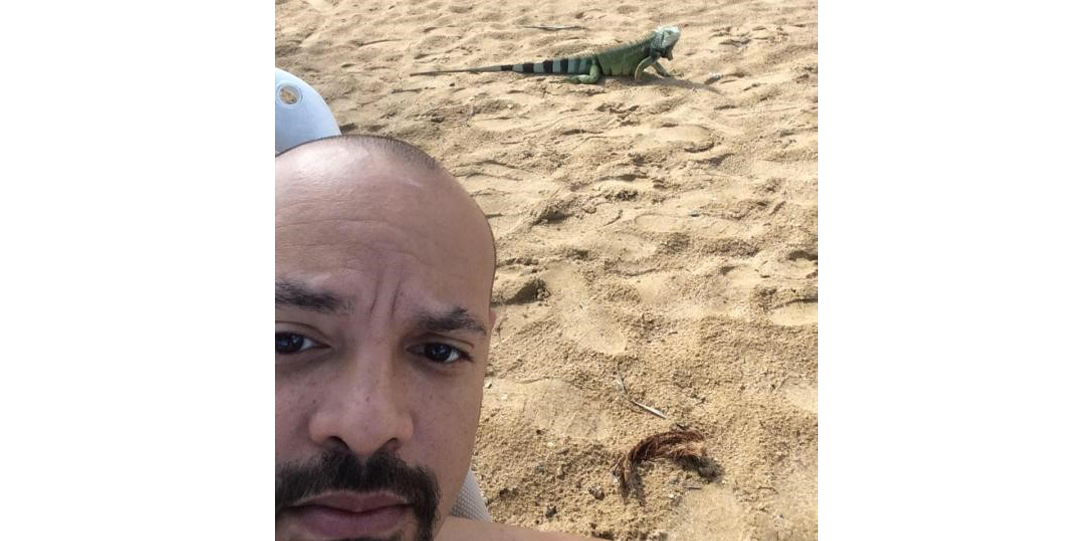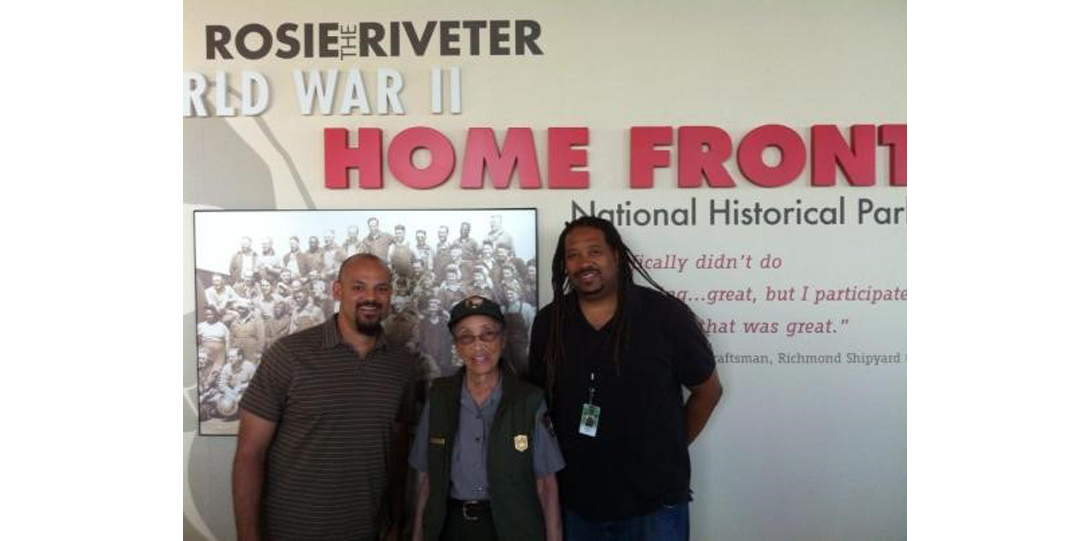Faculty Spotlight: Professor Cedric Johnson
In the Fall of 2015 we sat down with Cedric Johnson to talk about his interests, academic career, and influences. In his interview he talks about his experience attending school in Louisiana and Ohio, his mentors from graduate school, and how his views of politics and social justice were formed. The interview was conducted by graduate assistant, Nicole NeSmith.
Part One of Interview with Cedric Johnson
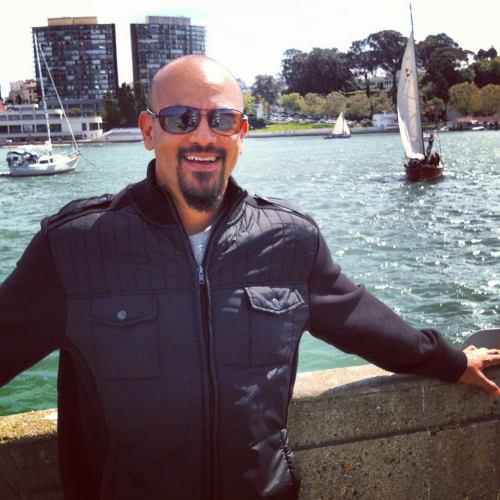
You mentioned in your blog post on “Hurricane Katrina, 10 Years Later: When the Investor Class Goes Marching In” that post-Katrina New Orleans has 97,000 fewer African Americans. What does it mean for a city to lose them?
Cedric Johnson: There’s a huge difference in how the city feels, especially at the neighborhood level. Some areas like New Orleans East, parts of Gentilly and certainly the Lower Ninth Ward north of St. Claude Avenue are just not the same. You can also feel the difference politically.
I think this is the biggest change since Katrina—the political realignments. You lost 7,500 unionized school teachers, mostly African American women. As a result, you can see a difference in how people discuss various issues in New Orleans. For example, you don’t have an effective opposition to the pro-growth agenda connected to the tourism industry. You have some labor unions that are fighting, as well as some other community groups, but these forces are not as elaborate and powerful as in other cities, nor as strong as they were in pre-Katrina New Orleans. As I argued last year during a conference at Tulane University, New Orleans may be the most neoliberal city in the United States, a place where the free market model reigns without much effective political opposition.
In “Hurricane Katrina” you seemed very much interested in the concept of social justice. Is this something that motivated you to teach African American studies?
Johnson: Many of us blacks who went to grad school in the early nineties hoped that we would create social change. That cohort that came of age during the last years of the Reagan-Bush era were politicized by the international fight against apartheid in South Africa, domestic struggles against the rollback of civil rights reforms and the New Deal, and the worsening social conditions in many urban black communities. I was hoping I would gain some insights that would help me to devise solutions to some of the problems I’d grown up with in Louisiana. I quickly discovered, however, that mainstream political science at that time really wasn’t concerned about the same things that animated me intellectually.
What are some influential works that you would suggest for African American Studies student?
Johnson: That would be a long list of suggestions!
In the area of social justice?
Johnson: Still too broad.
I can give some suggestions that might be helpful for those folks who want to gain a better understanding of the Katrina disaster and the politics of reconstruction in the New Orleans. I would recommend the recent symposium organized by Touré Reed that appeared in the on-line journal Nonsite. This symposium features articles by Reed, Thomas Jessen Adams, John Arena, Megan French-Marcelin and yours truly, and we all consider issues of black poverty and American inequality more generally on the occasion of the fiftieth anniversary of the Moynihan Report on the Negro Family, and the tenth anniversary of the Katrina disaster.
To gain a better understanding the problems of the market-centered recovery that’s radically reshaped the city, I would also suggest taking a look at Adrienne Dixson’s writings on school privatization, Vincanne Adams’s Markets of Sorrow, Labors of Faith and John Arena’s Driven from New Orleans: How Nonprofits Betray Public Housing, and everything written by Adolph Reed, Jr. on the subject, especially his essay, “The Three Tremés,” which was also published in Nonsite. There are a number of great works on the local culture and the evolution of the city’s tourism economy, Kevin Fox Gotham’s Authentic New Orleans and Mark Souther’s New Orleans on Parade. I’m also a huge fan of Michael Crutcher’s book, Tremé: Race and Place in a New Orleans Neighborhood and Matt Sakakeeny’s Roll With It: Brass Bands in the Streets of New Orleans. Both are required reading for understanding the evolution of jazz and the significance of black creole parading traditions.
David Redmon’s documentary film Mardi Gras: Made in China is also helpful for understanding how the local tourism industry is connected to the lives of workers in the global economy. And the edited collection by Thomas J. Adams and Steve Striffler, Working in the Big Easy provides one of the few panoramic views we have of the historical experiences of the city’s laboring classes.
Finally, there are a ton of great films on New Orleans. My favorites are Luisa Dantas’s film, Land of Opportunity, Tia Lessin and Carl Deal’s Trouble the Water, and Roxana Walker-Canton and Tina Morton’s Belly of the Basin. Check them out, pronto!
Who were some people in academia that influenced you?
Johnson: William “Nick” Nelson, Ron Walters, Linda Faye Williams were my mentors and advisors during graduate school at Ohio State University and the University of Maryland. Sadly, we’ve lost all three of them over the past decade or so. They were all giants in my world. Some of the other people who had an important influence on me as a graduate student include Clarence Stone who is a prominent urbanist, Ollie Johnson, a Brazil specialist who is like a big brother to me, Dorith Grant Wisdom, Ronald Terchek, and in the Ohio State University’s black studies department, Ike Okafor Newsum, among many others. These were all people I worked with as a student.
In terms of intellectuals who shaped my thinking and the work that I do in profound ways, there are many, but Adolph Reed, Jr.’s writings may have had the greatest single impact on my thinking about African American political life. David Harvey’s writings are a seemingly bottomless reservoir of insight on the process of capital accumulation and its bearing on urban life. I return to his work again and again. At one time or another, I’ve binged on the writings of Robert C. Smith, Harold Cruse, Frantz Fanon, Herbert Marcuse, and many others.
The African American Studies Department has a very interdisciplinary structure. Our faculty is representative of this. Some do more gender, some communication, some queer theory, some politics. What made you want to focus on politics?
Johnson: I attended a historically black university, Southern University-Baton Rouge. As might be expected, so many of the students there were encouraged to major in fields that might lead into lucrative careers and a middle class lifestyle. I chose political science at first because it seemed to allow me to study some of the subjects I was interested in, and to possibly pursue a career as a lawyer, which seemed like a viable option to me as a 18 year old. Then I took some political science classes with Gary Clark who is now a professor at Dillard University. His engaging style, his passion for teaching, and the way he held us to such a high standard all really cemented things for me. He helped me break out of some of my reticence. I wanted to be like him, have the same effect on students and kindle their passion for political life.
Part Two of Interview
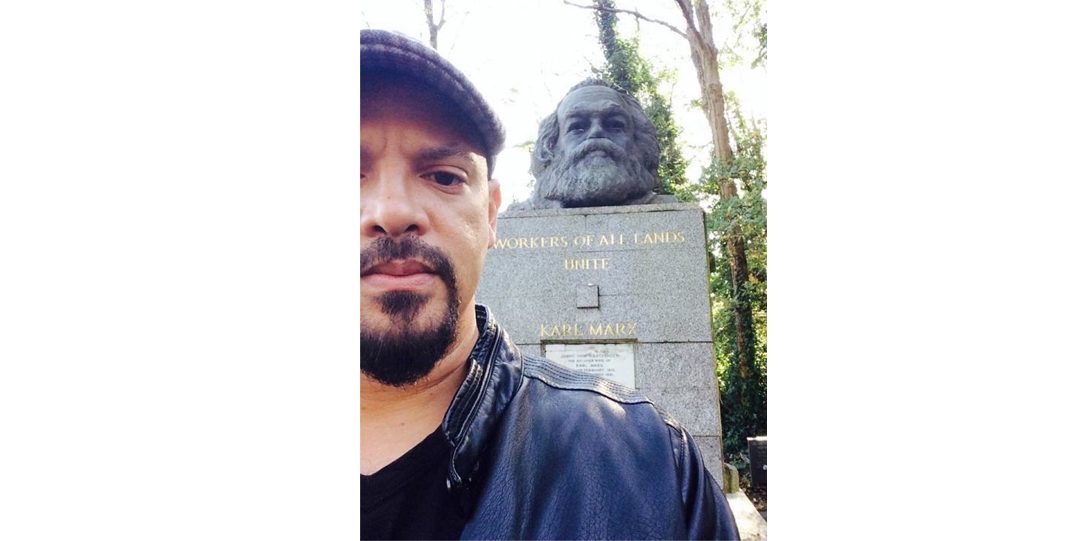
Was it a conscious decision to attend Southern University because it is a historically black college?
Johnson: Most black people in Louisiana during the eighties went to either Southern University or Grambling, actually. Students who were interested in the medical professions may have attended Xavier University in New Orleans. But at that time, most of the larger majority-white state schools did not have a good record of admitting and graduating African American students. Both of my parents went to Southern in the 60s. So I didn’t even think about it at the time as a conscious decision. It was tradition.
I’m also from the South, so I’m always interested to meet someone who grew up there and went to a southern institution. How did it inform your education?
Johnson: I grew up in a majority black town, Opelousas, Louisiana, and in a large, and activist black church community. Back in the 80s the church I went to was the largest black Catholic church in the U.S. My hometown was the center of a rural farming area with dense social networks, and a culture that was very communal. But there was also a huge division with regards to the color line. Even though the town was majority black, up until the middle eighties, it was still controlled by the old white merchant-landlord class. The church was really instrumental in my upbringing.
What was the name of the church?
Johnson: Holy Ghost Catholic Church in St. Landry Parish.
During the seventies the Roman Catholic Church in my hometown was undergoing a process of desegregation. Before then, there were two catholic schools: the Academy of the Immaculate Conception, which was for whites, and Holy Ghost Catholic school for blacks. These were merged to form Opelousas Catholic, a K-12 integrated school, which I attended for elementary school. The two largest catholic churches in town—there were four altogether—were Holy Ghost and St. Landry and these two were about 200 meters apart and separated by a cemetery, which they shared. McKnight was instrumental in integrating the catholic churches in the region, changing the practice of separate seating that had been the Jim Crow way.
Part Three of Interview
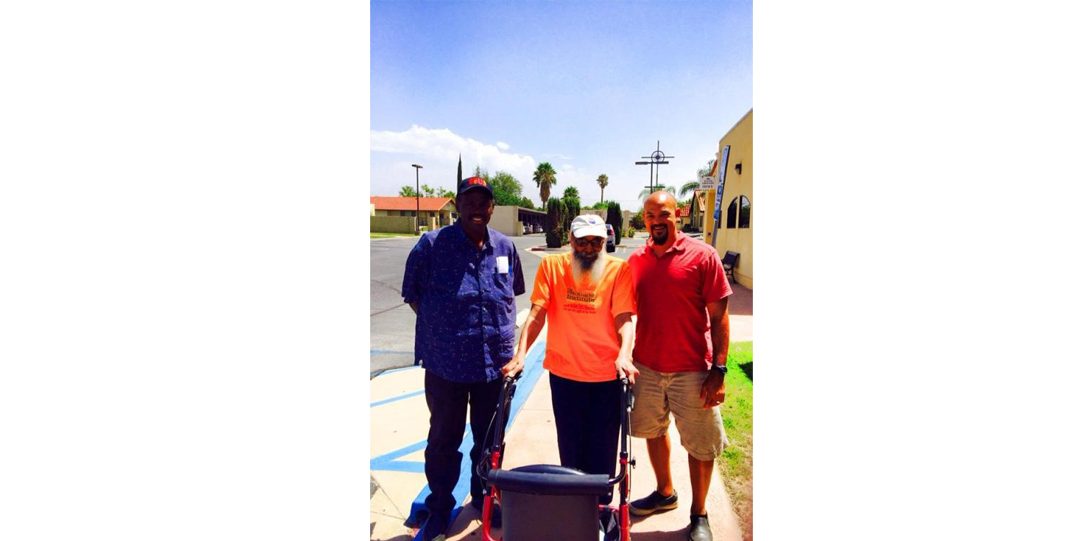
While he was pastor at Holy Ghost, there were all sorts of programs for young people. The intellectual life of a progressive church is something I want to convey here. It was an intellectual life that was very much practical. We didn’t read in the sense of trying to produce original research or engage in abstract questions, but you were expected to be informed and work at solving collective problems. Also, the approach to scripture was something unique, more inflected with liberation theology and very different from the kind of prosperity gospel that you hear from some contemporary black Christian preachers.
My mother served in the parish council, the church’s representative leadership body, as council president for two terms and then again as vice president. The congregation was a hub of social and political activism throughout the eighties and early nineties, hosting the Black Youth Congress which drew hundreds of teenagers from Louisiana, Texas and Mississippi, and Camp Manhood Development for Black Boys, constructing an assisted living housing complex and creating the annual Southwest Louisiana Zydeco Music festival.
Even the fairly staid process of confirmation, the Catholic equivalent of bar mitzvah, was reworked under McKnight. Instead of focusing solely on religious education, we learned about public health, sexuality, and HIV-AIDS. We discussed adolescent growing pains, read and discussed books like Carter G. Woodson’s The Miseducation of the Negro, developed and performed skits to explore different social issues, and debated the problems facing African Americans during the Reagan-Bush era. For a short time, the church launched a cooperative supermarket, Heritage Square, and the congregation’s activism was crucial in electing the first black mayor, city councilors and chief of police.
During my junior year of high school, Holy Ghost was a driving force behind protests against a pending school consolidation plan which would close various community schools throughout St. Landry parish, many of them located in majority black farming communities. The protests escalated over the course of a year with a student-walkout, sit-ins and mass arrests, and eventually, a march to the state capitol. The new schools were eventually built, but the activism altered the terms of public debate and the site selection decisions, and empowered blacks throughout the Parish.
Seeing how difficult it is to contest those who were in power and the school consolidation plans, that experience drove home the point that social change requires protracted struggle. You could attend meetings, you could march on the state capital, mobilize hundreds of people one day, thousands on another, and this still may not give you the resolution that you want. In politics you win some times and lose more often. Hard work may not deliver the policy that was desired but it still impacts people and communities in subtle and consequential ways. During the course of those local struggles during the late eighties, we realized that we didn’t have a to accept certain conditions, and that was really important. Powerfully important!
As far as lessons learned in my hometown during the eighties, as we were fighting the school consolidation program, we didn’t have the support of enough of the whites and maybe that wasn’t possible in that moment. With the contemporary struggles around police brutality, there is the perception that what you see right now is a popular movement. I’m not so sure. It has popular resonance to be sure, but how engaged people are, and how committed to protracted engagement remains to be seen. There may be people upset by police brutality who are not really engaged by the demonstrations in the larger cities or epicenters like Ferguson. You need to have the capacity to compel those in power—in city hall, legislatures, Congress— to do something different. As we’ve seen historically, building effective political power capable of changing the status quo actually takes time The contemporary protests over the killing of Michael Brown in Ferguson, Freddie Gray in Baltimore, and so many others are part of a longer lineage of campaigns and organizing efforts that stretch back to the earliest opposition to zero tolerance policing and the Reagan-Bush era War on Drugs. Perhaps it’s because of the Twitter culture and the expectations of instant gratification we live with now, but I think there is considerable naiveté in certain corners about what it takes to change things.
How would you relate this specifically to Chicago?
Johnson: For example, in a place like Chicago where we have decriminalization of marijuana recently, we should ask ourselves “how did we get decriminalization? Was it through large protests, and televised demonstrations or through more conventional political activity? People are infatuated with the drama of the post World War II civil rights movement; the heroes, villains, epic battles and martyrs. The historical reality is that the underlying activities that make social movements, and sustain them, are pretty boring.
There is a prevalent romanticism of the imagery of the civil rights movement that’s been handed down through video. In the real world of politics, things move at a really slow pace, most of the time. The axes of conflict are also not always so sharp and are certainly not fixed. There aren’t always clear heroes and villains. And some of the most important actions may not involve marches or being arrested. Sometimes filing an amicus brief, or even testifying before a council meeting may be more impactful.
For students who are interested in pursuing African American Studies in undergrad, grad or beyond, it may be helpful to hear your trajectory. What are the options for people with an AAST degree?
Johnson: [laughs] Based on what I’ve said they might be left feeling a little deflated. It’s definitely helpful for people who are going to be working in cities. Beyond the content knowledge there are also the tools of historical interpretation, critical analysis of culture and politics, ongoing events, and these are all skills that will serve students well as they excel in their professions and settle into life as citizens. When I was in graduate school, some people discouraged majoring in black studies or African American Studies because it wasn’t seen as a money-making field. I think some of the terrain has changed since then. Students, and even some employers for that matter, understand the value of liberal arts education more generally, and the virtues of area studies in particular in a globalized, interconnected and urban world.
Were you involved with a lot of political issues/rallies in college and later?
Johnson: Yeah, there were a few. In college there was the fight to defeat David Duke. He was a Klansman and neo-Nazi who ran for the Louisiana Senate seat in 1990 and for state governor in 1991 and was defeated both times by a progressive coalition of blacks and whites. I attended rallies and did my part. I’ve never really thought of myself as an organizer, however, but rather as an engaged citizen.
There was also the Persian Gulf War. I participated in some campus efforts to develop student consciousness and opposition, but this was tough at a university where we had so many students enrolled in ROTC programs, and who saw the military as a route to middle class success.
In graduate school, I was involved in some anti-sweatshop activism, and what would become the anti-globalization movement. I participated in the April 26 demonstrations against the World Bank in Washington, DC. This was a year after the Seattle protests against the WTO. I also took part in a protest on the steps of the nation’s capitol in 1999 after the killing of Amadou Diallo, an unarmed Guinean immigrant.
Part Four of Interview
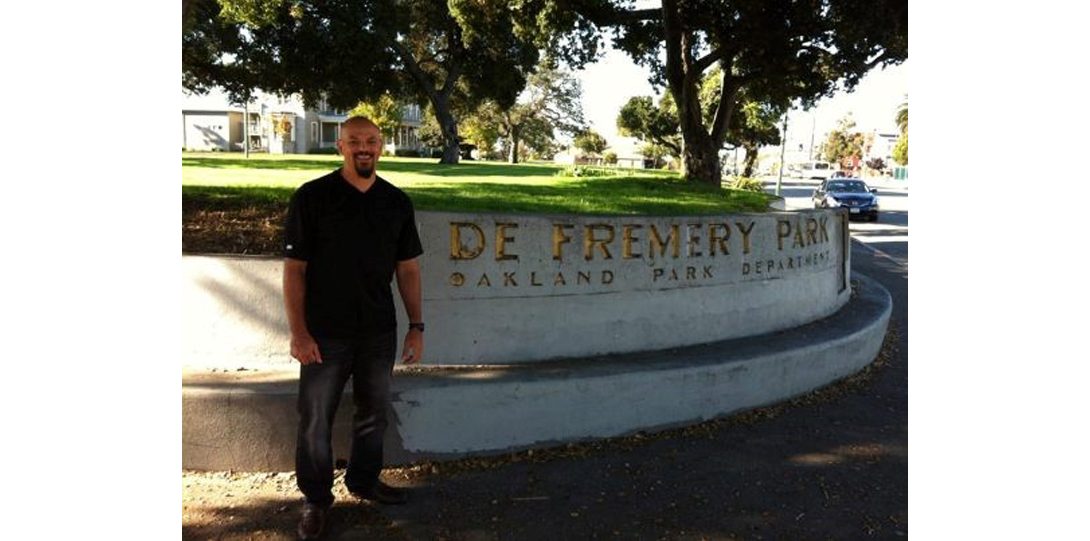
Once I started working in Rochester, NY I got more involved in local union activism, especially in planning public events that would educate folks about labor issues. I co-taught a class on Race, Labor and American History for a group of Rochester public school teachers. I also took students from Hobart and William Smith Colleges on factory tours. Over the years, I took multiple groups to the Kodak paper-finishing facility and the Hickey-Freeman apparel plant in Rochester, and the Guardian glass factory in Geneva, New York. These trips gave us a chance to see the labor process in motion, and think through class relations in really concrete terms. We also did walking tours of the city of Rochester which has a rich history of union organizing, and also abolitionist and women’s suffrage activism as well.
I also served on the Rochester Labor Council’s education committee, which was charged with planning the annual Labor Lyceum, a monthly program of public discussions and lectures, and the Rochester Labor Film series which featured weekly screenings of international films on labor and class every fall. Eventually, I was recognized by the Central Labor council with the Jon Garlock Labor Educator of the Year Award. This meant a lot to me because Jon was a mentor to me along with a group of really progressive union activists and labor educators like Linda Donahue, the late Jim Schmidt, Denise Young, and Vincent Servallo. Being a part of their community is one of the things I miss about living in Rochester.
What are some things that students should know about you outside of your academic interests?
Johnson: I’m a southerner to my core, no matter how much of an urbanite I’ve become. The things that I enjoy doing are connected to that culture and upbringing. I like to entertain people. I enjoy cooking, and grew up in a setting where everybody cooks—women, men, young and old— and everyone is really serious, and maybe a bit hypercritical, about the proper way of doing things in the kitchen.
I’m always up for a good road trip. And having grown up with a father who was a music educator and working tenor saxophonist, I also love live music.
Chicago is great for that.
Johnson: Indeed, it is!

